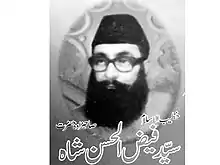Faiz-ul Hassan Shah
Faiz-ul Hassan Shah, known by some as Khatib ul Islam, was a Pakistani Islamic religious scholar, orator, poet, and writer.
Hazrat e Khatib Ul Islam حضرت خطيب الإسلام Faiz-ul Hassan Shah سيد فیض الحسن شاه | |
|---|---|
 Faiz Ul Hasan Shah, 4th President of Jamiat Ulema-e-Pakistan | |
| Personal | |
| Born | Faiz ul Hassan Shah 1911 |
| Died | 22 February 1984 (aged 72–73) |
| Resting place | Allo Mahar, Punjab, Pakistan |
| Religion | Islam |
| Denomination | Sunni |
| Lineage | Husayn |
| Jurisprudence | Hanafi |
| Creed | Ahl as-Sunnah wa’l-Jamā‘h |
| Main interest(s) | Hadith, oratory, Tasawwuf, and Islamic Philosophy |
| Muslim leader | |
| Leader of the Naqshbandia Mujadadia Aminia | |
| In office 1932 – 22 February 1984 | |
| Preceded by | Syed Muhammad Hussain Shah |
| Succeeded by | Khalid Hasan Shah |
Political and social contribution
He was president of Jamiat Ulema-e-Pakistan for ten years, and struggled to establish Islamic reforms in Pakistan. He was also a provincial president of Majlis-e-Ahrar-ul-Islam.[1]

Religious and academic work
In 1932, after the death of his father, he became the religious leader of Allo Mahar. He began leading Friday prayers and teaching the congregation of Allo Mahar in different parts of the Indian subcontinent and became a famous orator. He contributed to the Tahreek-e-Tahaffuz-e-Khatm-e-Nubuwwat , which is an organization created to preserve the Islamic tenet of Finality of Prophethood.} He led the movement in the days of British rule in India against Ahmadis. For 20 years he led the Eid prayer in the police line at Gujranwala. Faiz Ul Hassan He visited Karachi as a president of Jamiat Ulma e Pakistan and made his historic speech which was highly appreciated by all scholars at that time.[2]

References
- "Tazkira Mashaikh e Allo Mahar Sharif Urdu PDF Download". 11 December 2018.
- [Adara e Tanzeem ul Islam(2013);declaration. "Pir Faiz ul Hassan as a president of jamiat ulama e Pakistan" Press. p24].
- The Preaching of Islam by Sir Thomas Walker Arnold and Langue la literature Hindoustanies de 1850 à 1869 by M.J.H. Garcin de Tassy.
The most well-known treatises and reports, written by the authors of the early period are:
- Mashaiekh e Allo Mahar Shrief written by Allmaa Pir saeed Ahmad Mujadadi and published by Idara e Tanzeem ul Islam Gujjranwala.
- "Allo Mahar Sharif". Kawajgan e Naqshband (book name).
- "Kwaja Nur muhammad chhrahi's caliph". Arbab e Waliyat (book name).
- "caliph's of chura sharif". Auliya e pothohar (book name).
- Shaik gulam nabi. Amir e Karwan Syed Faiz ul Hasan shah (book name).
- "Syed Faiz ul Hassan shah". Tahreek e Ihrar (book name).
- Dr. Rizwan Sarwar. Mashaikh e Maharvia (under publish).
- Pir Saeed Ahmad Mujadadi. Maharvia number (book name).